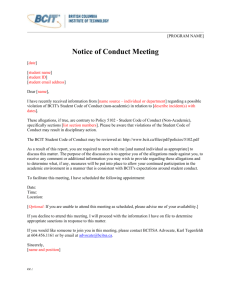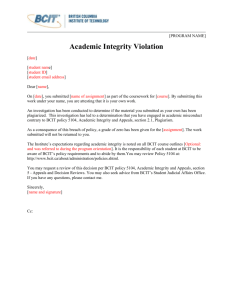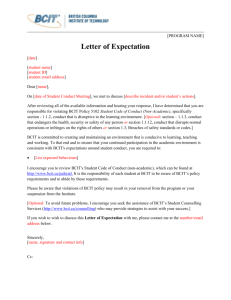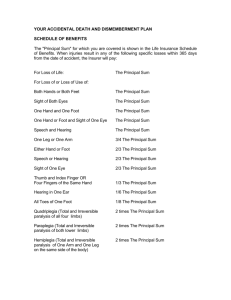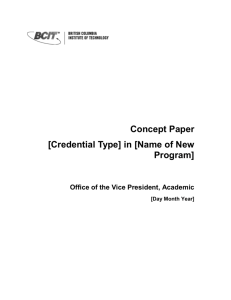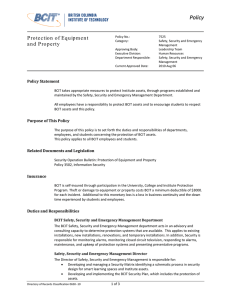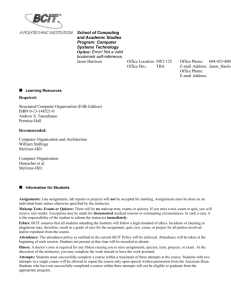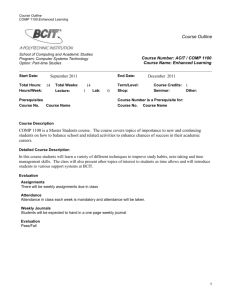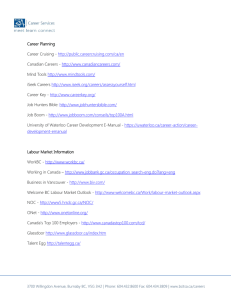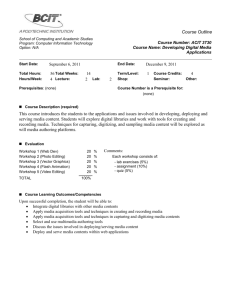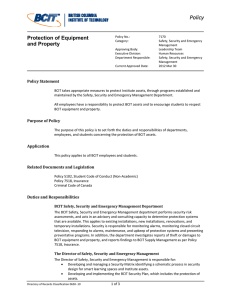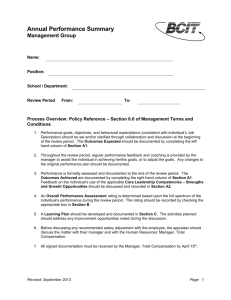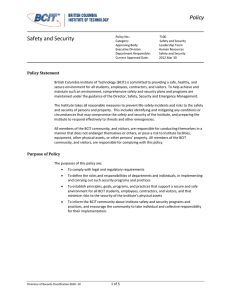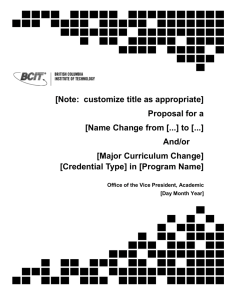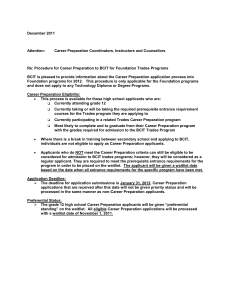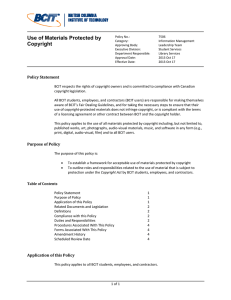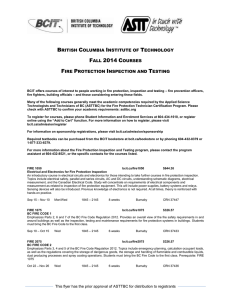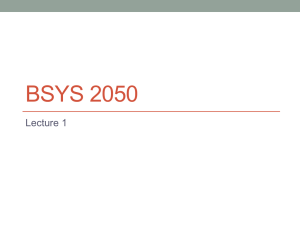PROJECT PROPOSAL PREAMBLE
advertisement
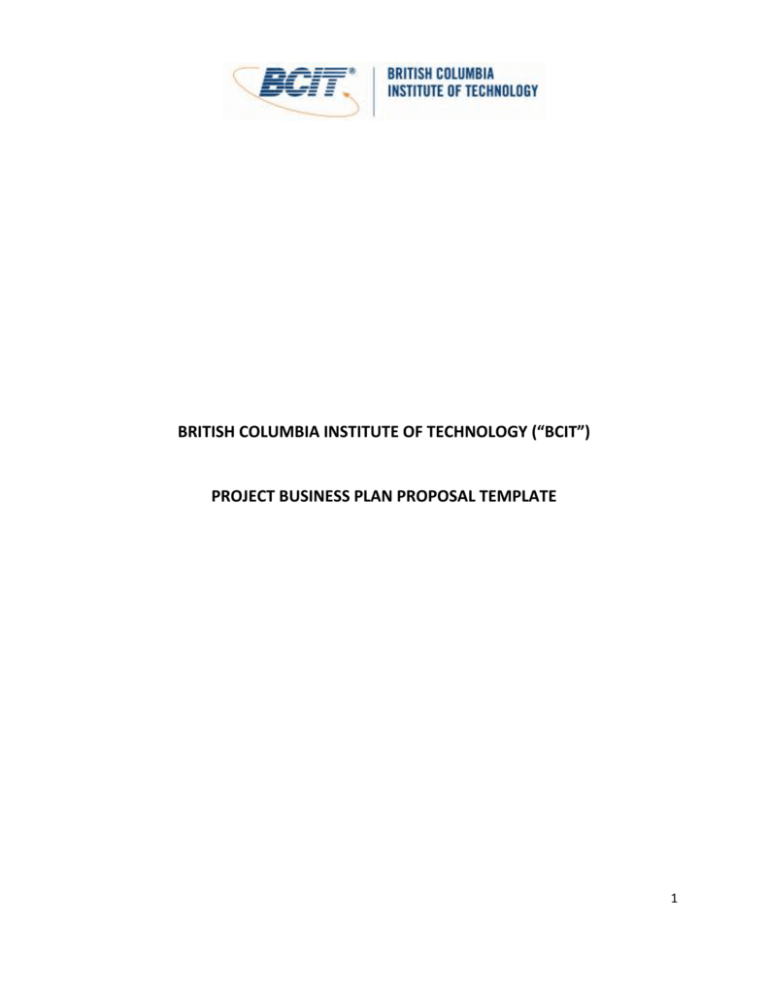
BRITISH COLUMBIA INSTITUTE OF TECHNOLOGY (“BCIT”) PROJECT BUSINESS PLAN PROPOSAL TEMPLATE 1 PROJECT PROPOSAL PREAMBLE To obtain project approval from BCIT each school/department must submit a Project Business Plan Proposal. The proposal is an essential tool for leadership to evaluate a project and to assist management in anticipating and planning capital expenditure priorities. The merits of a plan at the four stages of development are as follows: Planning It sets out management’s best estimate of the future in a logical and organised way, thus crystallising ideas, highlighting potential problems and identifying areas requiring further detailed consideration. Financing It assists in planning for and raising finance whether from government sources, partner capital, Institute funding or BCIT Foundation fundraising sources. Implementation It provides management with guidelines for running the project efficiently. Monitoring It allows management to assess and control the actual progress of the project by comparison with the financial projections included in the plan. Every plan is different so, depending on the nature of the project and the purpose for which the plan is ultimately intended, not all the guidelines provided in the template may apply. Be sure to tailor your plan accordingly. Confidentiality If your plan needs to be treated confidentially, please clearly indicate this on all sheets. 2 1.0 PROJECT CONTACT INFORMATION Submitted by: British Columbia Institute of Technology 3700 Willingdon Avenue Burnaby, BC V5G 3H2 Canada www.bcit.ca BCIT Project Leader/Manager Department/School Contact name/s Telephone& fax numbers Email address Partner Organization Contact name/s Telephone & fax numbers Email address Foundation Office Contact name/s Telephone& fax numbers Email address If applicable If applicable 3 2.0 EXECUTIVE SUMMARY This is the most important part of the proposal. The summary should be brief but should also be convincing, provide a clear description of exactly what the project is about and why it is important to BCIT. 3.0 PROJECT DESCRIPTION Provide a detailed description of the project. In bullet format include: Project goals – what will the project achieve (infrastructure renewal, training aids, research resources) Activities undertaken to achieve the project goals Define the project objectives and highlight the activities to be performed Identify the outputs from the project including any long term outcomes Timelines including the project start and end dates (when do you expect to undertake and complete the stated tasks and objectives) Any known strategic alliances (industry training opportunities) Project location Total project cost Project stakeholders including external partners 4.0 PROJECT BACKGROUND Include any relevant background information. 5.0 RATIONALE FOR INSTITUTE INVOLVEMENT Explain why the Institute should give consideration to the project. What are the advantages and benefits to BCIT expected as a result of the project and how do they link to BCIT’s strategic mandate. Explain what the impact is if BCIT does not do the project. 6.0 IMPACT ASSESSMENT 6.1 Horizontal Impact Specify how the project adds value to other areas of BCIT including links to targeted priorities of the schools, pan institutional needs or other objectives such as diversity. 6.2 Environmental Impact Discuss what, if any, impacts there are on the environment. Under Strategic Initiative 4 of the “The BCIT Strategic Plan 2009-2014” you must ensure that the plan meets the following objectives: Provide a safe and healthy environment for Institute employees, students and for the communities where we live and operate by integrating sound environmental practices 4 into our business decisions; and by establishing quantifiable goals and accountabilities for environmental performance in accordance with the BC Climate Action plan. 7.0 STRATEGIC PARTNERSHIPS Indentify government or other organizations involved or committed to the project under consideration. Describe how strategic partnering is able to add value to the project and how it could capitalize on existing programs and/or services at BCIT or of other government or related organizations. 8.0 PROJECT DELIVERABLES Describe the impact on student recruitment and retention, programs and new opportunities. Identify project milestones, specific deliverables, completion dates for each and how completion will be verified. A table format is recommended. Milestones/Deliverables Sample Table [date] Activity & corresponding milestone #1 [date] 2 [date] 3 Etc etc 9.0 RISK ASSESSEMENT PLAN Identify and mitigate any risks associated with the project (i.e. overruns, potential cash flow shortages, possible delays, management considerations, etc.) Examples of common project risks could include: Time and cost estimates too optimistic Unexpected budget cuts Unclear roles and responsibilities Lack of resource commitment 10.0 PROJECT FUNDING AND CASH FLOW ANALYSIS Provide the following information with respect to the project funding and cash flow: Identify how much is required to fund the project (from all sources) and explain why funding is required. Provide a detailed budget and timeline of cash flows relative to achieving the stated project objectives (see appendix A &B). Identify each funding source, the relative amounts and the degree that they are pending, firm or committed. Comment on how the amounts were derived (based on firm quotes, estimates, client or other forecasts, etc) 5 Include any information that is relevant to Institute operations including additional costs and cash flow implications to the Institute once the project is complete ie facilities support, ITS support, additional staffing, maintenance costs, space, etc. 10.1 Funding Gap Comment on the dependence of funding from each source for the project to proceed in terms of whether it would not proceed at all or that it may proceed but with a different scope, different timelines or different location. Describe what kind of leverage funding is required ie Foundation driven fundraising, Institute funds, etc. 11.0 FINANCIAL STABILITY The project proposal should indicate how the school or department has sufficient cash flow and the management capability to successfully implement the project. Management must ensure that the plan meets Strategic Initiative 4 of the “The BCIT Strategic Plan 2009-2014” on Financial Stability which states: #19. #20. 12.0 Develop resource allocation processes that support the strategic plan, including annual and multi-year budget and operational plans that integrate activities and support decision making; Develop a management framework that provides accountability and transparency for the long-term financial sustainability of the organization. PROJECT MEASUREMENT METHODOLOGY Specify how the project will be measured, such as project reporting monthly etc, observation and/ or site visits, 3rd party reporting or any other means. 13.0 PROJECT COMPLETION INDICATORS Indicate how you will demonstrate that the project is complete and has met the stated objections e.g. event held, reports produced, etc. Are there any announcements, publications, special considerations or communication opportunities once the project is complete? 6 APPENDIX A PROPOSED PROJECT COST SUMMARY Proposed Project Cost Summary Capital and Equipment $ Subject Matter Expert (SME) time, curriculum development and associated human resource costs. Physical Space Allocation ** Existing facilities and associated services $ Other Project operating costs $ $ Total $ Proposed Funding Sources BCIT Institute Contribution Cash (funding sources may include operating funds, etc.) Noncash (these costs include space, staffing, etc. that the Institute does not incur as a direct cost output but is an input for consideration) Funding Partner/s (external agencies that have indicated a commitment to the project) $ $ Government Agencies $ Fundraising Component $ Debt (borrowing) Component (if applicable) $ Total Funding Requirement $ **Physical Space Allocation is currently calculated as $30 per square foot per year in the projected life of the project. 7 APPENDIX B CASH FLOW FINANCIAL PROJECTION The purpose of the Cash Flow Financial Projection is to provide estimates of the incremental impact that the project activities will have on BCIT. Please ensure that all underlying assumptions, calculations and supporting details for the project are available upon request. Sample Project Expenses (as applicable) Total Salary Expense Supplies Equipment Maintenance Staff PD/Travel Marketing Total Expenses Year 1 550,000 60,000 16,000 9,500 10,000 645,500 Year 2 Year 3 Year 4 640,000 800,000 1,000,000 80,000 93,000 120,000 20,000 23,000 30,000 10,000 12,000 14,000 12,000 14,000 16,000 762,000 942,000 1,180,000 Revenue Estimated revenue from all sources including grants, contracts, services, R&D, industry training, etc. 130,000 190,000 300,000 480,000 650,000 Expenses Less Revenue 515,500 572,000 642,000 700,000 650,000 Total Startup Costs Year 5 1,100,000 130,000 34,000 18,000 18,000 1,300,000 $3,079,500 Please be sure to include any additional start up costs , examples - renovations, customization of existing space, space to accommodate new equipment, etc. 8
